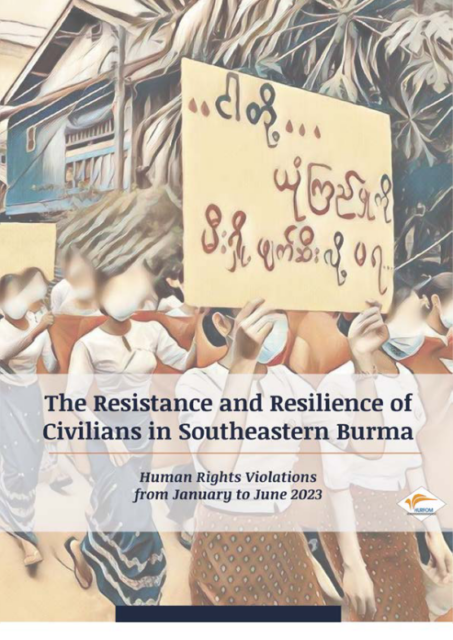The Resistance and Resilience of Civilians in Southeastern Burma: Human Rights Violations from January to June 2023


While there has been much suffering in Burma since the attempted coup on 1 February 2021, there have also been unmatched strategies of resistance used by civilians who have overwhelmingly rejected the junta’s illegal and unsuccessful conquest. The Spring Revolution is rooted in pro-democracy principles, established by people of all ethnicities and backgrounds. The Burma Army has threatened to silence these efforts with their brutality and acts of warfare. However, an unwavering commitment of spirited resistance has remained to ensure that at the very least, the next generation does not have to live under military rule.
The Burma Army has responded to the widespread opposition with acts of terror because they fear accountability for their actions, and they most certainly are concerned about a future that adheres to international law and human rights principles. Further, the junta is aware of the power of the Spring Revolution and the determination of the people who refuse to live under a dictatorship. They know this because they are losing the war they have been fueling for the last seventy years.
Unfortunately, the international community has failed to challenge the junta’s dictatorship. Global and regional actors, including the Association of Southeast Asian Nations (ASEAN), have moral and diplomatic obligations to support the people’s calls and work towards an inclusive future in Burma that is free from military rule and where everyone can live with their rights protected.
The Human Rights Foundation of Monland (HURFOM) has closely monitored the daily challenges and acts of resistance across our target areas of Southeastern Burma, including Karen State, Mon State, and Tanintharyi region. This briefing paper, researched and produced by HURFOM, will provide a comprehensive overview of the human rights situation in Southeastern Burma from January to June 2023. It will also cover how different communities have responded to the junta through various protest and resilience-based strategies.
Women and ethnic people have faced widespread and systematic abuse by the military for decades. They have joined forces with ethnic revolution organizations (EROs) and community-based groups to actively lead, initiate momentum, and ensure the world does not look away from the multitude of crises in Burma. Those leading the revolution are not only those on the front-lines armed with ammunition but also religious and community leaders, students, various affiliates within the Civil Disobedience Movement (CDM), and others working for progressive and inclusive solutions in Burma, such as supporting local governance infrastructure.
Despite their immense challenges, the people’s adversity is grounded in their ongoing contributions to human rights work and advocacy. This report will conclude with calls and recommendations to the international community.

